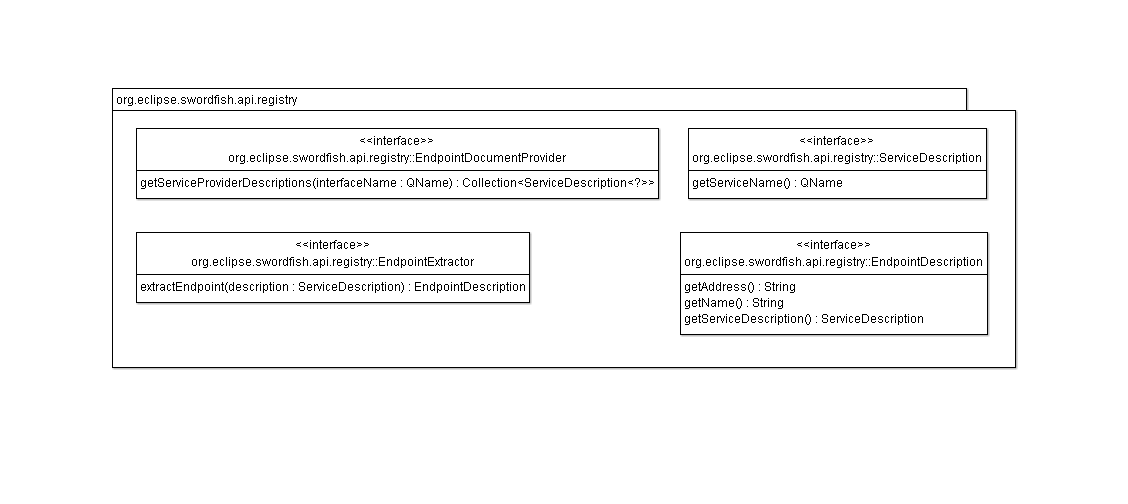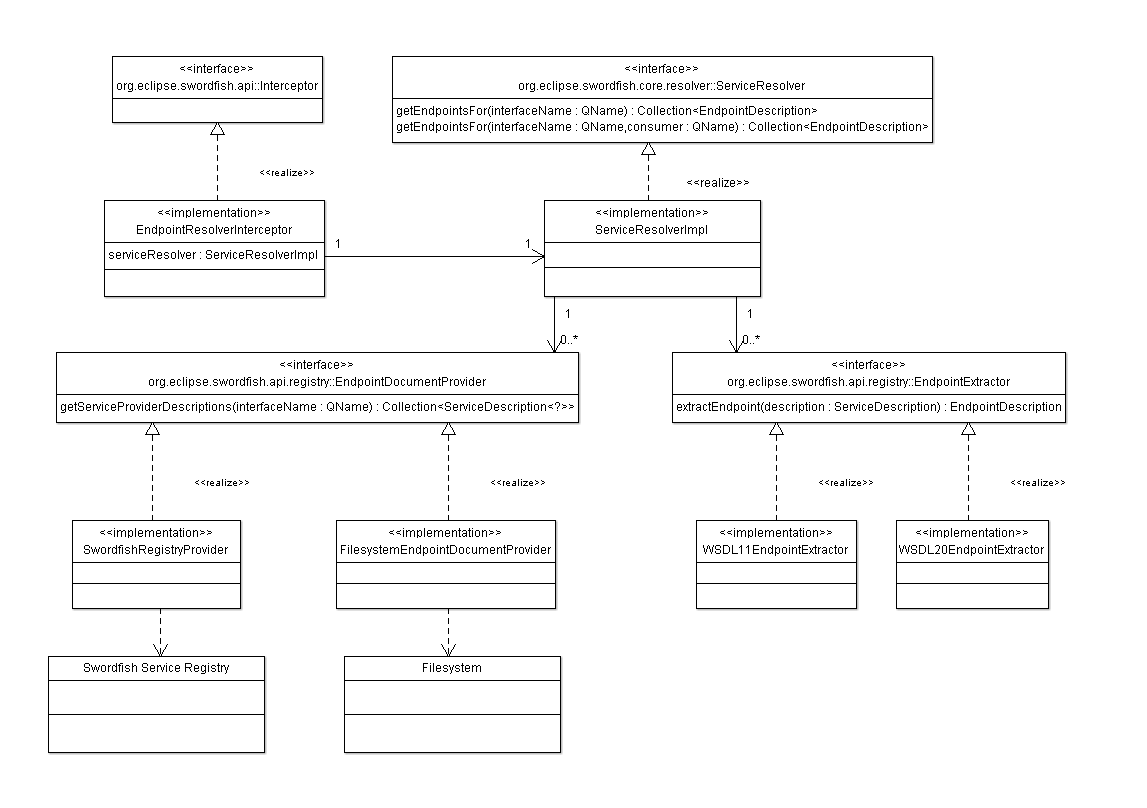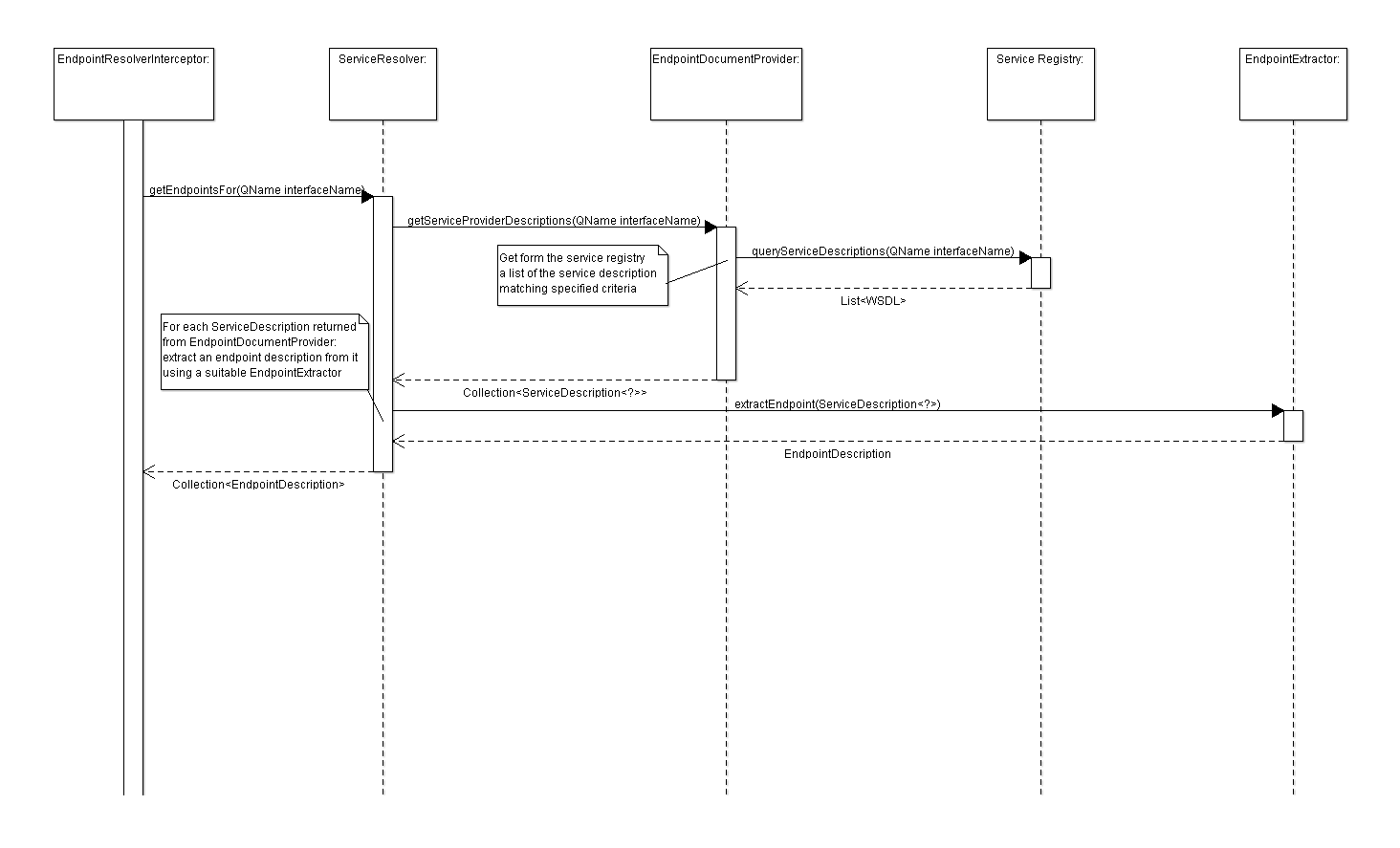Notice: This Wiki is now read only and edits are no longer possible. Please see: https://gitlab.eclipse.org/eclipsefdn/helpdesk/-/wikis/Wiki-shutdown-plan for the plan.
Difference between revisions of "Swordfish Documentation: Architecture: Service Registry Plugin"
| (6 intermediate revisions by the same user not shown) | |||
| Line 1: | Line 1: | ||
| − | <h1> | + | <h1>Plugin description</h1> |
The Service Registry Plugin consists of the following components: | The Service Registry Plugin consists of the following components: | ||
<ul> | <ul> | ||
<li>ServiceResolver - resolves information about the service endpoints for specified service using endpoint document providers and endpoint extractors</li> | <li>ServiceResolver - resolves information about the service endpoints for specified service using endpoint document providers and endpoint extractors</li> | ||
| − | <li>EndpointDocumentProvider - is responsible for retrieval of service | + | <li>EndpointDocumentProvider - is responsible for retrieval of service description from different kinds of location. |
Different implementation of the EndpointDocumentProvider can be used to get the service descriptions from local filesystem or from a remote registry.</li> | Different implementation of the EndpointDocumentProvider can be used to get the service descriptions from local filesystem or from a remote registry.</li> | ||
| − | <li>EndpointExtractor - extracts endpoint parts (endpoint address, transport protocol) from the service description | + | <li>EndpointExtractor - extracts endpoint parts (e.g. endpoint address, transport protocol) from the service description representation. |
| − | At the same time multiple endpoint extractors can be registered in the system, each suitable for processing one | + | At the same time multiple endpoint extractors can be registered in the system, each suitable for processing one type of service description document (e.g. extractor for WSDL 1.1 based service descriptions, extractor for WSDL 2.0 and so on).</li> |
| − | + | ||
| − | WSDL 1.1 based service descriptions, extractor for WSDL 2.0 and so on).</li> | + | |
</ul> | </ul> | ||
<br/> | <br/> | ||
| − | The endpoint resolution process | + | The endpoint resolution process is described by the folowing scenario: |
<ol> | <ol> | ||
| − | <li>ServiceResolver gets all EndpointDocumentProviders registered at runtime and chooses one with the highest priority. The chosen provider is then queried for service description | + | <li>ServiceResolver gets all EndpointDocumentProviders registered at runtime and chooses one with the highest priority. The chosen provider is then queried for service description documents corresponding to the specified service interface. All found documents are returned from provider as collection of the ServiceDescription objects where each ServiceDescription represents one raw description document.</li> |
| − | + | ||
| − | documents corresponding to the specified service interface. All found documents are returned from provider as collection of the ServiceDescription objects where each ServiceDescription represents one raw | + | |
<li> | <li> | ||
| − | ServiceResolver gets all registered EndpointExtractors and uses them to extract endpoint | + | ServiceResolver gets all registered EndpointExtractors and uses them to extract endpoint description information from received ServiceDescriptions. |
| + | At this step it also performs [[Swordfish_Documentation:_Architecture:_Policy_Trading_Plugin | policy trading ]] which allows to exclude non-matching service descriptions from the extraction process. Extracted endpoint descriptions are grouped as collection of EndpointDescription objects and returned to caller.</li> | ||
</ol> | </ol> | ||
<br/> | <br/> | ||
| − | |||
<h1>Component diagrams</h1> | <h1>Component diagrams</h1> | ||
| − | == Public API | + | == Public API of the Service Registry Resolving component == |
[[Image:RegistryAPIPackage.png]] | [[Image:RegistryAPIPackage.png]] | ||
| − | == Sketch of сomponent сlasses for Service Endpoint Resolution | + | == Sketch of сomponent сlasses for Service Endpoint Resolution == |
[[Image:ServiceRegistryCommunicationComponents.png]] | [[Image:ServiceRegistryCommunicationComponents.png]] | ||
| − | == Sketch of Service Endpoint Resolution sequence | + | == Sketch of Service Endpoint Resolution sequence == |
[[Image:EndpointResolution.png]] | [[Image:EndpointResolution.png]] | ||
Latest revision as of 09:27, 26 March 2009
Contents
Plugin description
The Service Registry Plugin consists of the following components:
- ServiceResolver - resolves information about the service endpoints for specified service using endpoint document providers and endpoint extractors
- EndpointDocumentProvider - is responsible for retrieval of service description from different kinds of location. Different implementation of the EndpointDocumentProvider can be used to get the service descriptions from local filesystem or from a remote registry.
- EndpointExtractor - extracts endpoint parts (e.g. endpoint address, transport protocol) from the service description representation. At the same time multiple endpoint extractors can be registered in the system, each suitable for processing one type of service description document (e.g. extractor for WSDL 1.1 based service descriptions, extractor for WSDL 2.0 and so on).
The endpoint resolution process is described by the folowing scenario:
- ServiceResolver gets all EndpointDocumentProviders registered at runtime and chooses one with the highest priority. The chosen provider is then queried for service description documents corresponding to the specified service interface. All found documents are returned from provider as collection of the ServiceDescription objects where each ServiceDescription represents one raw description document.
- ServiceResolver gets all registered EndpointExtractors and uses them to extract endpoint description information from received ServiceDescriptions. At this step it also performs policy trading which allows to exclude non-matching service descriptions from the extraction process. Extracted endpoint descriptions are grouped as collection of EndpointDescription objects and returned to caller.



